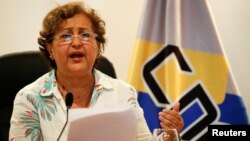Venezuela's election board said on Monday the opposition successfully collected 1 percent of voter signatures in every state in the first phase of their push for a referendum to recall socialist President Nicolas Maduro.
But council head Tibisay Lucena asked for a judicial probe into some apparent cases of voter identity fraud, and did not name a date for the next phase, to collect 20 percent of signatures.
The timing is crucial because if Maduro were to lose a referendum this year, as polls indicate he would due to an economic crisis, that would trigger a new presidential vote, giving the opposition a chance to end 17 years of socialism.
But should he lose a referendum next year, Maduro, 53, would be replaced by his vice president, maintaining the Socialist Party in power until the OPEC nation's next presidential election scheduled for the end of 2018.
Opposition leaders are demanding Lucena set a date for the collection of 20 percent - about 4 million signatures - needed next to trigger the actual referendum.
"Only one step remaining," tweeted opposition lawmaker Freddy Guevara. "The better Venezuela is coming."
Henrique Capriles, who narrowly lost to Maduro in the 2013 presidential race and has been the main driver of the recall push, called for rallies later this week to pressure for the next phase.
Earlier, U.S. Secretary of State John Kerry also urged Venezuela "not to play a game of delay" over the referendum.
The government, however, has vowed there will be no referendum this year. It has launched nearly 9,000 lawsuits, alleging massive fraud in signature collection.
"Legally, it is dead," said senior Socialist Party leader Jorge Rodriguez.
Lucena said that 98 percent of nearly 408,000 signatures gathered by the opposition Democratic Unity (MUD) coalition - twice the minimum required of 1 percent or 200,000 - in the initial phase were validated.
She requested a probe into the others.
Critics blame failed socialist economic policies for Venezuela's three-year recession, triple-digit inflation, product shortages and long lines at shops.
Maduro, a former bus driver and foreign minister who succeeded the late Hugo Chavez, said the fault lies with falling oil prices and an "economic" war by opponents.
Adding to the heated political climate, Venezuela's Supreme Court ruled on Monday night that the opposition-controlled National Assembly's activities would be "null" until it withdrew three opposition legislators whom the tribunal had suspended pending a probe into alleged vote-buying.






